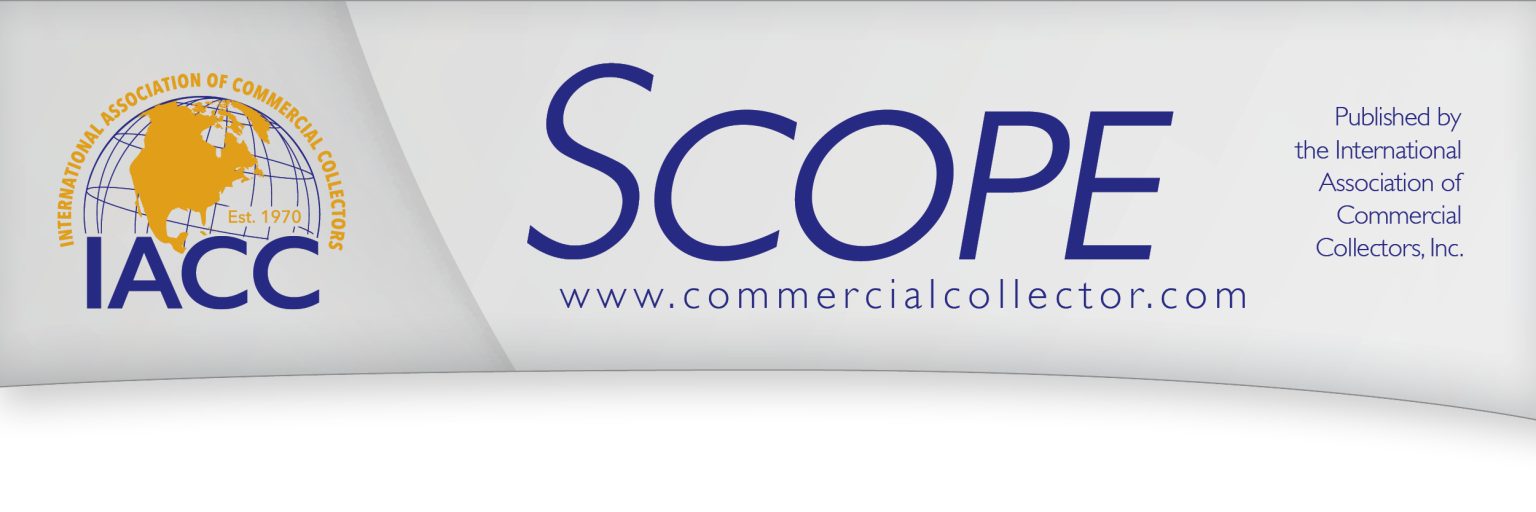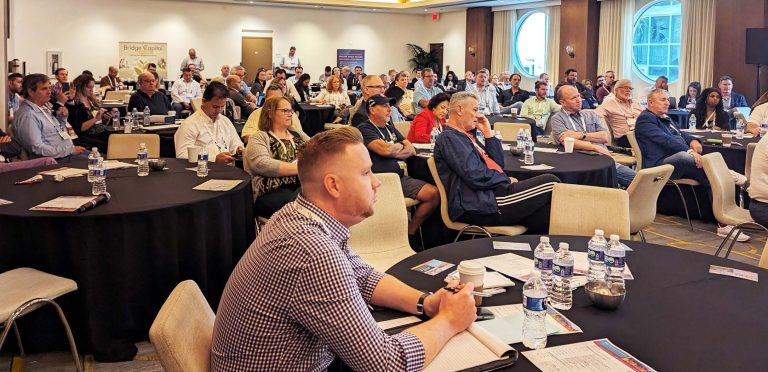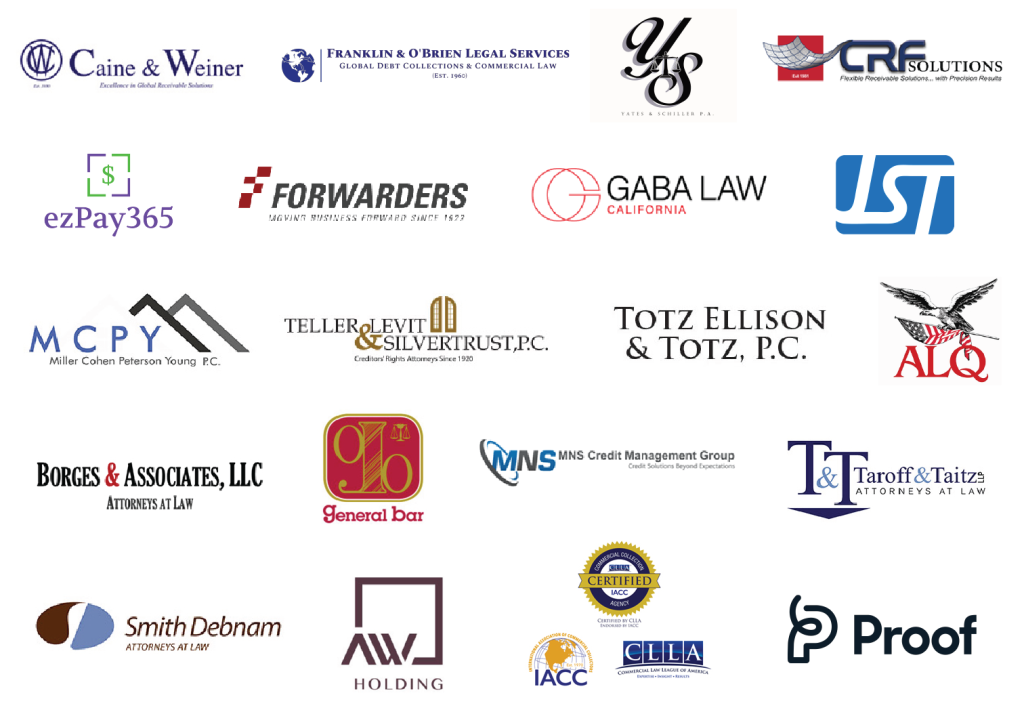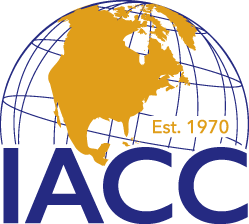
2024 - February

Convention 2024 Kicked Off the Year In Grand Style
Sharing insights, best practices and challenges—that’s why trade associations exist. The IACC members who gathered in South Beach Miami exemplified the best aspects of association community building as they came together to discuss the commercial collection industry’s opportunities and difficulties.
In the largest gathering of members since pre-COVID, 146 registered attendees and their guests came together at the Royal Palm South Beach Miami for three days of networking, education sessions and social events.
Twenty-three international members attended, representing companies from Bahrain, Belgium, Brazil, Canada, Curacao, Germany, Great Britian, India, Netherlands, Poland, Switzerland, Trinidad & Tobago, Turkey, and the United Arab Emirates.
The educational programming at this year’s convention continued IACC’s longstanding tradition of being an industry leader in commercial collection education. Many attendees had positive comments throughout the conference and found practical ideas from each session to bring back to the office. This year’s session topics included legal and compliance updates, a session on international collections, succession planning and strategic mentoring, and everyone’s favorite session—hot topics. There was also a presentation by Ghandi Eswarmoothy with the Consumer Finance Protection Bureau (CFPB) about the bureau’s oversight of the collection industry. The keynote session presented by Tom Morrison included a deep dive into the impacts artificial intelligence will have on business.
This year’s convention featured a new agenda format in which sessions started a day earlier on Wednesday afternoon, which opened up a half day of free time on Thursday afternoon so that members could network in small groups and enjoy the South Beach area shops, restaurants and attractions. Sessions on Thursday morning were capped off with a special event lunch at Nikki Beach, a unique outdoor dining venue.
Next year, IACC is excited to take the annual convention to a new beach: Puerto Rico! Mark your calendars now to join us at the Royal Sonesta San Juan, Jan. 22-24, 2025.
In addition, IACC is already planning for a blow-out farewell to the annual Mid-Year Conference with one final mid-year event scheduled for July 19-21 in San Diego. Earlier this year, the IACC Board of Directors made the strategic move to eliminate future mid-year conferences. This was in part in response to members’ comments about the pressures of attending so many industry events and in part a desire to focus on making the IACC Convention the “must-attend” event of the year. San Diego has always been a favorite location for IACC members to meet, and we look forward to putting on an amazing event to say farewell to this longstanding IACC tradition.
We hope to see you in both San Diego and Puerto Rico!
A Glimpse Into the Future
Highlights from the IACC Convention in South Beach - By Valerie Ingold, IACC President
 I am just back from our Annual Convention and I’m still buzzing from the good vibes, great education and amazing connections I made while there. As I’ve previously talked about, the mid-year is a great meeting for connecting on an intimate level and invaluable as a first-timers conference, but nothing quite matches the vibrant atmosphere of our Annual Convention, and this year was truly exceptional. We were thrilled to welcome pre-pandemic attendance numbers, showcasing the resilience and enthusiasm of our community.
I am just back from our Annual Convention and I’m still buzzing from the good vibes, great education and amazing connections I made while there. As I’ve previously talked about, the mid-year is a great meeting for connecting on an intimate level and invaluable as a first-timers conference, but nothing quite matches the vibrant atmosphere of our Annual Convention, and this year was truly exceptional. We were thrilled to welcome pre-pandemic attendance numbers, showcasing the resilience and enthusiasm of our community.
The Convention and Education Committees deserve immense praise for curating an outstanding program that catered to diverse interests and needs. From special events and education tailored to our emerging leaders to dedicated sessions and networking opportunities for our international members, there was something enriching for everyone. I am especially delighted to note that we welcomed 20 new attendees to our meeting this year, demonstrating the growing interest and relevance of our community.
This year, we decided to shake things up by adjusting the schedule. Rather than starting on Wednesday night with the Welcome Celebration, we began with afternoon education on Wednesday followed by our cocktail parties and Welcome Celebration. We also moved our special event (typically on Thursday night) to a luncheon on Thursday. We had amazing food and a fun atmosphere at Nikki Beach, which got us outside and enjoying each other’s company in a more casual setting.
The mid-afternoon wrap-up on Thursday allowed attendees to savor quality time with loved ones, explore the area, or simply relax on the beach—an experience that was warmly received by many. It also allowed everyone to plan for dinner on their own, which was a departure from our past conventions. The people we’ve heard from so far have loved it— but we want to hear from you! If you loved it or hated it, please let us know. Especially because we’re planning this new schedule for next year’s Annual Convention in Puerto Rico!
Education Round Up
One of the highlights of the convention was undoubtedly our keynote address, “AI… Be a Friend or Be Afraid.” Talk about timely! Tom Morrison captivated us with insights into how AI can streamline processes, enhance decision-making, and revolutionize customer interactions, as well as giving us quite a few takeaways from the session.
We had an array of activities focused on international education and networking. These provided valuable opportunities for our members to delve into the nuances of cross-cultural communication and the challenges of global compliance. We engaged in interactive discussions, sharing experiences and strategies to navigate the complex international landscape.
A special segment of the convention was dedicated to emerging leaders in the collections field. Seasoned professionals and new entrants alike benefited from the emerging leaders’ session, “Succession Planning and Strategic Mentoring,” fostering a sense of community and collaboration that is essential in today’s globalized world.
We also had the privilege of gaining insights from Ghandi Eswaramoorthy of the Consumer Financial Protection Bureau (CFPB). With a wealth of expertise in consumer finance and regulatory compliance, he offered invaluable guidance on navigating the evolving landscape of the collections industry. Through his presentation and interactive discussion, we had the opportunity to deepen our understanding of regulatory requirements and explore proactive approaches to address emerging challenges.
Networking and Recognition
Beyond the formal sessions, the conference overflowed with opportunities for networking. From breakfasts to coffee breaks to fun evening social events, attendees formed connections that promise to extend well beyond the event. These informal gatherings were not only a highlight for many of us, but also a testament to the vibrant and collaborative spirit of the IACC community.
Finally, I extend my heartfelt congratulations to this year’s award winners: Rebecca Robitaille (Associate) and Michelle Lindsay (Agency) for the Robert P. Ingold Emerging Leader Award, and Jim McConville for the IACC Leadership and Distinguished Service Award. Your contributions are truly commendable!
Looking Ahead
It’s clear that the collections industry is at a pivotal juncture. The integration of AI and a strong focus on global initiatives are not just trends, but have the ability to reshape the core of our profession, propelling us toward a future where innovation and learning will go hand in hand to meet the evolving needs of our industry.
We thank all our esteemed speakers, panelists, and attendees for making the IACC Convention a resounding success. Let’s continue to innovate, inspire, and lead as we eagerly anticipate next year’s conference in Puerto Rico!
Convention Sponsor Shout Out
No meeting can be completed without the participation and support from so many parties. IACC would like to thank its sponsors for the 2024 Convention.

Thank You to Our Meetings Committee
The IACC Annual Convention could not be as successful as it is without the tireless efforts of our Meetings Committee.
Thank you to the following members:
Chair: Randy Frazee
Members: Greg Cohen, Todd Gurstel, Jeff Rubin, Gary Tier, Wanda Borges, Joe Batie
New Members as of February 1, 2024
Agency Membership
IDCC
Holon, Israel
Nexia Insolv Ltd
Nicosia, Cyprus
Carter-Young, Inc
Monroe, GA
Associate Membership
Ragan & Ragan, PCWall, NJ
Wright Law Group PLLC
Houston, TX
Affiliate Membership
MaxyfiChicago, IL
Session Recap: Legal Update for Commercial Debt Collectors

Speaker: Colin Winkler Senior Counsel, ACA International
Colin Winkler, ACA International’s senior counsel, gave a legal update on commercial debt collection during the IACC Annual Conference, discussing recent actions from the Consumer Financial Protection Bureau and other regulators, as well as trends in business practices. Here are some highlights from his presentation on coming changes to the industry.
The CFPB Winkler said the CFPB has been very active in the consumer space, but commercial collection has remained relatively calm. In 2022, Rep. Al Lawson, D-Fla., introduced legislation to expand the Fair Debt Collection Practices Act to cover commercial collections, but that bill died in committee. “To my knowledge, we have not seen an attempt from Rep. Lawson or anyone else to resurrect it,” Winkler said. The CFPB remains very interested in demographic disparities in the small business segment.
One example of that is the CFPB’s Small Business Lending Rule, which requires lenders to disclose credit applications they receive from small businesses, lending decisions and demographic data. The resolution passed in the U.S. Senate but was voted down in the House and vetoed by President Biden in December 2023. The Senate then approved a joint resolution to override that veto, but could not muster enough votes.
“We don’t often see Congressional Review Act action on a federal rule like this,” Winkler said. “And again, because the Senate could not muster the votes to override the veto, the rule did take effect, but it remains on hold—at least as a practical matter—as a result of a couple of federal injunctions pending the SCOTUS decision in Consumer Financial Services of America v. CFPB. Federal courts in Kentucky and Texas issued injunctions that for now prevent the CFPB from enforcing this rule. Those cases rest primarily on the argument that the CFPB lacks a constitutionally appropriated funding mechanism. And that’s the argument that the Supreme Court heard in October 2023 in CFSA v. CFPB.”
A decision in that case is expected by the end of June 2024.
“That will go a long way toward determining whether and how the CFPB can take action,” Winkler said. “I think most court watchers expect that the Supreme Court is going to say the CFPB does have a constitutional funding mechanism, but that is just based on speculation of court watchers from around the web.”
Winkler said these events are important for IACC members to know about because they are indicative of the CFPB’s mindset, which might impact conversations you have with your clients.
The FTC The Federal Trade Commission enforces commercial collections violations. The enforcement cases it has pursued recently have been for egregious violations, like in FTC v. RCG Advances LLC, where the commission sued the company and its owners for unfair commercial debt collection practices when collecting on merchant cash advances, including sometimes threatening physical violence.
And in a 2022 case, the FTC said Yellowstone Capital, which was a provider of merchant cash advances, continued withdrawing money from businesses’ bank accounts after their balance had been repaid. The FTC initiated an enforcement action that resulted in nearly $10 million dollars being returned to those businesses.
“If the FTC is focusing on behavior like this, then I think from a federal regulatory perspective, the commercial collection space is in pretty good shape,” Winkler said. “Still, it remains to be seen what’s on the horizon for commercial collections in 2024 as they continue to advance their fairly aggressive agenda.”
The TCPA Determining whether a phone number is a business or residential line for Telephone Collection Practices Act purposes has become more complex, so proper consent is important.
The FCC’s “lead generator rule” requires one-to-one consent for calls related to leads, which could impact how consent is obtained and applied.
“The whole TCPA landscape has gotten significantly muddier for what I think of as business-to-business collections calls because of the integrated technology we have now, where a cellphone can have a dual purpose as a business line and also exist—in at least a court’s and the FCC’s mind—as a residential telephone line,” Winkler said. “And then again, that one-to-one consent rule muddies the waters. Some of us may have been relying on consent obtained through a lead generator, but now that’s got to be obtained on a one-to-one basis.”
Also, IACC members should keep in mind that their calls to cellphones may be blocked or mislabeled as spam. Be ready to work with your carriers through the FCC’s robocall mitigation database to address any mislabeled calls.
Personal Guarantors
Pursuing personal guarantors of commercial debts could potentially lead to FDCPA liability if not handled carefully.
“I think you need to understand how sophisticated your clients’ clients are,” Winkler said. “A lot of people who sign a personal guarantee don’t know what it is exactly they’re signing for their small business. A lot of those consumers won’t understand that you’re collecting a business debt, and that they’re not entitled to the protections of the FDCPA. And by attempting to enforce that personal guarantee, you could be creating risk for yourself. So again, I think that’s the kind of risk assessment you have to do by understanding your clients’ portfolio and who it is you’re ultimately going to be calling. Because often the small businesses are going to be defunct by the time you end up going to collect and it will be the individual guarantors you’re collecting from.”
Winkler said he does see cases like that in bankruptcy courts and in federal district courts. He said he generally sees courts asking, “What’s the [essence] of this agreement? What was it for and for what was it used?”
“And if it’s for business purposes, then you’re good,” Winkler said. “But as we just talked about, regardless of a personal guarantee, if that loan or equipment or vehicle ended up being used for personal or household purposes, that’s what the courts tend to look at under the FDCPA.”
An attorney in the audience said that her company started including a sentence in their demand letters that says: “You are receiving this letter because you have personally guaranteed a commercial debt.’”
Electronic Consent
Winkler said he is seeing more court cases on electronic consent, which has to do with understanding what sort of an agreement your client has secured from their client.
Electronic consent generally comes in two flavors: browsewrap and clickwrap.
Browsewrap assumes users have accepted an agreement if they use the website.
For example, the website might say: “If you submit this form, you’re agreeing to our Terms and Conditions.” The terms are usually hyperlinked, but the consumer doesn’t necessarily have to look at those terms and conditions in order to advance through the process of getting whatever it is they need. This matters because it affects contract formation, Winkler said.
Most lawyers and judges prefer clickwrap, which forces consumers to demonstrate assent to terms and conditions by having them check a box that indicates their consent.
“We’ve seen, particularly out of the 9th Circuit, a number of cases that have found that while browsewrap can be enforceable, it really needs to be prominent,” Winkler said. “And when we say that in the browsewrap context the terms and conditions need to be conspicuous, we’re talking at least as large, if not larger than, the surrounding font, a different color, ideally bold faced, and ideally with surrounding text that calls attention to them with a line break. You want something that a judge is going to look at and say, ‘There’s no way that whoever is being held to the agreement could have missed this.’”
Session Recap: Navigating International Waters
Moderator: Jassim Darwish, Managing Director of Epic Credit Recoveries. Panelists: Kornel Tinguely, CEO of Creditreform Romandie DNT SA in Switzerland; and Ayse Burcu Arslan Demirtas, General Manager of ARS Consultancy in Turkey.
In their session, “Navigating International Waters,” panelists from Turkey and Switzerland reviewed some of the challenges companies may face with international collections, such as differing statutes of limitations between countries, currency exchange rate fluctuations, and legal/regulatory differences. Here are some highlights from their discussion.
Statutes of Limitations The statute of limitations changes from country to country. Ayse Burcu Arslan Demirtas, general manager of ARS Consultancy, noted that the statute of limitations in Turkey is 10 years, which is quite long.
“The contract matters,” she said. “What we have seen so far is that if the contract allows the creditor to sue the debtor in the debtor’s country, the debtor’s country’s statute of limitation is held responsible for this time limitation. If there is a payment or a clear written payment promise is made, this time even can be extended.”
That’s why it’s important to move as quickly as possible when you have a collection case.
“The statute of limitations starts running from the invoice date,” Ayse Burcu Arslan Demirtas said. “So if there had been a partial payment, let’s say after six months or one year of the invoice date, then it means another extra 10 years from that payment.”
Contract Language and International Sales
The contracts creditors have with clients are critical. Having terms and conditions in the contracts for collection fees or the specification of currency helps, but it doesn’t give a guarantee.
“It depends on the country where the debtor is,” Ayse Burcu Arslan Demirtas said. “Also, in some industries, sometimes it is forbidden to collect late payment fees. For example, this is the case in the airline industry. Even if the country of Switzerland allows you to collect interest on collection costs, you can’t [collect] for airline companies because of IATA regulations, which don’t allow for collecting any money, any collection fees and anything on top of the principal amount. It is strictly forbidden.”
She continued: “The common mistake in cross border collection is to assume that whatever we have in our own country applies also in the other country. So in order to prevent that, clear conditions, like making agreements in advance, make a huge difference.”
Debt Collection as a Developing Industry
“Turkey is a developing country, and its debt collection industry is a developing industry,” Ayse Burcu Arslan Demirtas said. “While I was studying in the Netherlands, I noticed that in Amsterdam, there were hundreds of collection agencies, whereas there were none in Turkey. We are still at the stage of educating our clients [on] how a collection agency is different from a law firm or a call center, which are the two main actors in our country that dominate the market.”
She continued: “I have been giving debt collection trainings to Turkish companies to educate them on the advantages of a collection agency’s involvement. But still, debtors have questions about who we are. If you say you’re not an attorney, and you’re operating under the name of a consultancy company from administrative and financial advisory services, it’s really complicated for debtors to understand who we are. So we are unfortunately fighting with the perception of being the mafia or something. That’s why it’s really important to invest in the reputation of our companies. Since 2015, I have given a lot of interviews online, on television and in newspapers, which helped to gain the trust of debtors who we approach for our foreign clients.”
Language Barriers
In Europe, collection agencies need to work in the local language of each country, as legal documents often need to be submitted in the official language. Using English may not be accepted.
Translating documents can add significant costs to pursuing legal action, and official certified translations are usually required.
It’s also important for collection agencies to partner with companies in other countries that are fluent in the local language to facilitate collections and understand local rules. Relying only on translations may cause problems in the future.
Europe has more than 30 countries and the European Union has 27, and almost every country has its own language. So, if you try to collect in Germany, Sweden or Switzerland, you need to know which language to use.
“In Switzerland, we have four official national languages and about 8 million inhabitants,” Ayse Burcu Arslan Demirtas said. “If you go legal, you have to use the language of the region in Switzerland. If you are in France, you are obliged to go French, and so on. So it is important that you speak the language.”
Depending on the importance of the claim, you may be asked to provide official translations of your legal documents.
Additionally, if you win your case, the judge may rule that the debtor must cover translation costs, though this decision ultimately rests with the judge’s discretion. And in many countries, English is widely spoken by judges, so the judge may accept written translations submitted through deposition. However, navigating legal proceedings on an international level requires careful consideration of the potential costs associated with these language-related barriers.
Currency Fluctuations
Currency values vary from country to country due to a variety of factors, including inflation and supply and demand forces. For instance, Jasim Darwish said that in Egypt, the currency value changes almost by the hour.
“Most of the banks don’t accept payments in Egyptian pounds because of the crazy fluctuation and the deterioration of the value of the currency,” he said.
Kornel Tinguely said that in general, when you open a legal action, you have to open it with the currency of that country. And of course, the value of that country’s currency can be different from week to week or day to day.
“The exchanges between the euro and the U.S. dollar or Swiss francs and the U.S. dollar are really stable, but that’s not the case everywhere,” he said.
For example, the Turkish lira has devaluated rapidly. If you open a claim for 20,000 in Turkish lira, some years later when you finally have a judgment and collect the money, you might only get only 5,000 back. That’s something you have to think about when you work at the international level.
Exchanging Files Between the U.S. and Europe
Kornel Tinguely noted that you can do cross-border collections from the U.S. in Europe, but “the majority of the companies or debtors in Europe won’t want to reply to you. So it’s best to work with a law office or a debt collection company in Europe.”
Moreover, in some countries, like Germany, it’s illegal to send a collection letter if you’re not authorized to do so.
“Typically, with my company in Switzerland, I can’t send a dunning letter to a debtor in Germany because it is forbidden,” he said. “The fine can be raised to 50,000 euro just for one letter.”
The bottom line? Often, insights from international collection experts can make all the difference.

Legislative Update: What You Need to Know About the Federal Corporate Transparency Act
By Wanda Borges of Borges & Associates
The Federal Corporate Transparency Act (FCTA), enacted in 2021 to curb illicit finance, requires most “reporting companies” doing business in the U.S. to report information about the individuals who ultimately own or control them. This information must be reported to the Financial Crimes Enforcement Network (FinCEN), a bureau of the U.S. Department of the Treasury.
This legislative update provides a summary of the FCTA requirements. The reporting regulations are found at Section 6403 of the Corporate Transparency Act. Specifically, the reporting rule is found at 1010.380 in title 31 of the Code of Federal Regulations.
FinCEN has published a “Small Business Compliance Guide” on Beneficial Ownership Information Reporting Requirements. That guide can be found online at https://www.fincen.gov/boi/small-entity-compliance-guide.
“Reporting Companies” are those that were formed in the U.S. under state law or Indian Tribal law and include corporations, limited liability companies, limited liability partners, limited liability limited partnerships, business trusts, and most limited partnerships. Foreign businesses may have to file a report if the business has registered to do business in any U.S. state or tribal jurisdiction.
Generally, the FCTA is aimed at businesses with up to $5 million in gross receipts or sales. Large corporations with 21 or more employees and gross receipts or sales in excess of $5 million are exempt from filing a report. There are 23 exceptions identifying which companies are exempt from the requirement to report beneficial ownership information. Those exceptions can be found in the guide referenced earlier.
Reporting companies that were established prior to Jan. 1, 2024, must file the Beneficial Ownership Information Report by Jan. 1, 2025. Reporting companies established after Jan. 1, 2024, must file the Beneficial Ownership Information Report within 90 days of their establishment.
A beneficial owner is an individual who owns or controls at least 25% of a company or has substantial control over the company. Typically, there are four bases to show substantial control: senior officer; member of a board of directors with power to appoint or remove officers or a majority interest on the board; ownership or control of a majority of voting power or voting rights; and rights associated with financing or interest.
Beneficial ownership information reporting is not an annual requirement. A report only needs to be submitted once, unless the filer needs to update or correct information. Generally, reporting companies must provide four pieces of information about each beneficial owner, including:
- Name,
- Date of birth,
- Address, and
- The identifying number and issuer from either a non-expired U.S. driver’s license, a non-expired U.S. passport, or a non-expired identification document issued by a state (including a U.S. territory or possession), local government, or Indian tribe. If none of those documents exist, a non-expired foreign passport can be used. An image of the document must also be submitted.
The company must also submit certain information about itself, such as its name(s) and address. In addition, reporting companies created on or after Jan. 1, 2024, are required to submit information about the individuals who formed the company (“company applicants”).
The simplest way to get to the filing site is to go to https://boiefiling.fincen.gov and follow the instructions.
Each of us should make sure that our corporate clients, for whom we manage corporate records, or those who represent trusts or foundations, should be counseling our clients and assisting them in complying with this reporting requirement.
Report Reveals Recent Surge in U.S. Bankruptcies
U.S. bankruptcy filings surged by 18% in 2023, reaching a total of 445,186 cases, up from 378,390 in 2022, according to bankruptcy data provider Epiq AACER.
The increase was particularly pronounced in commercial Chapter 11 filings, which saw a 72% increase, rising from 3,819 in 2022 to 6,569 in 2023. On the consumer front, filings rose by 18%, with 419,550 cases reported compared to 356,911 the previous year.
Research analysts attribute this uptick to various factors, including higher interest rates, stricter lending standards, and the gradual withdrawal of pandemic-related support resources. Despite the surge, it’s important to note that current insolvency levels remain below those observed before the onset of the COVID-19 pandemic.
November saw a slight dip in total filings, dropping to 34,447 from 37,860. However, this decrease does not overshadow the fact that filings for December were still 16% higher than the same period in the previous year.
“As anticipated, we saw new filings in 2023 increase momentum over 2022 with a significant number of commercial filers leading the expected increase and normalization back to pre-pandemic bankruptcy volumes,” said Michael Hunter, vice president of Epiq AACER. “We expect the increase in number of consumer and commercial filers seeking bankruptcy protection to continue in 2024 given the runoff of pandemic stimulus, increased cost of funds, higher interest rates, rising delinquency rates, and near historic levels of household debt.”
Meet the 2024 IACC Award Winners
This year’s award winners were recognized for their dedication and commitment to the betterment of IACC and the commercial collection industry. In addition to being recognized in this month’s issue of Scope, these award recipients were recognized at IACC’s 2024 Annual Convention in January.
IACC 2024 Robert P. Ingold Emerging Leader Award
This award recognizes early-careerminded collection agency (or law firm) professionals who have completed notable work of merit within their organization and IACC, and have demonstrated significant promise of leadership, service and professionalism within the collection services industry.

This year’s Agency Emerging Leader is Michelle Lindsay of ABC-Amega, Inc. Lindsay was brough to her first IACC convention last year and has hit the ground running by joining committees and being involved in the growth of the association. She has shown strong leadership skills not only within her organization but within IACC as well.
As part of her role as award winner, she will be serving as the chair of IACC’s Emerging Leaders Committee this year and holds a non-voting, honorary seat. *This award winner becomes the new Honorary Board Member for the Emerging Leader program as of the January board meeting.
 This year’s Associate Emerging Leader is Rebecca Robitaille of Franklin & O’Brien Legal Services Inc. Robitaille joined IACC’s Emerging Leaders and Communications committees, and her voice is helping to shape the future of the IACC as well as how the IACC is presented to the membership and beyond.
This year’s Associate Emerging Leader is Rebecca Robitaille of Franklin & O’Brien Legal Services Inc. Robitaille joined IACC’s Emerging Leaders and Communications committees, and her voice is helping to shape the future of the IACC as well as how the IACC is presented to the membership and beyond.
IACC 2024 Leadership and Distinguished Service Award
This award is presented annually to an IACC member who has given his or her time and energy to better the association, exemplifies IACC values and standards, has emerged as a leader in our organization and has conducted his or her professional and personal life in a manner that positively impacts the commercial collection industry.
 This year’s winner is Jim McConville of Radius Global Solutions, LLC.
This year’s winner is Jim McConville of Radius Global Solutions, LLC.
McConville was nominated for his tremendous, selfless and thoughtful contributions as well as his unwavering enthusiasm to step up and support the IACC. His nominator Greg Cohen had the following to say about Jim: “He is a deep thinker and great communicator. His guidance was spot on during difficult times and tough decisions. We have, thanks to his instincts and calm approach, mitigated any hardship.” He has served on the IACC Board since 2018 and has served as treasurer since 2019.
Board of Directors Update
The annual IACC membership meeting was held on January 18, 2024, in Miami, Florida. Outgoing IACC Board of Directors members Ron Stiegel, Brad Lohner, and Joe Batie were thanked for their service to the association. Their contributions, especially related to growing IACC’s membership, have built a foundation that will serve the association well into the future.
IACC’s 2024 officers are:
- President – Valerie Ingold
- Vice President – Erwin Falkner
- Treasurer – Jim McConville
- Immediate Past President – Bill Mann
- Honorary – Michelle Lindsay
Member News
Caine & Weiner Announces Executive Leadership Transition

Caine & Weiner, an IACC member company with a nearly 100-year history, announced a strategic shift in its executive leadership structure recently. Greg Cohen has assumed the role of chairman and chief executive officer, and Joe Batie was promoted to president and chief commercial officer.
Greg served as president since 1999 and president & CEO of Caine & Weiner since 2008. During his tenure, he led the company through significant growth and transformation, expanding its product offerings, strengthening its leadership team and customer base, and enhancing its financial performance.
Greg will focus on the company’s long-term strategic direction, ensuring its continued success in the evolving financial services landscape. Joe Batie, having served as Caine & Weiner’s chief commercial officer for the past 10 years, brings over 37 years of experience in the financial services industry to his new role as president and CCO. He has a proven track record of success in driving revenue growth, expanding market share, and building strong customer and alliance partner relationships.
In his new role, Joe is responsible for the company’s day-to-day operations, overseeing all aspects of its business, including operations, sales, marketing, product development, and customer service.
“I am excited to announce this strategic transition in our executive leadership,” Cohen said. “Joe is vastly experienced, a trusted and respected leader, well-rounded and deeply invested in all aspects of our stakeholder’s success.
“Joe, along with our outstanding leadership team, have significantly contributed to our company’s longstanding commitment to provide best-in-class Receivable to Cash Solutions and our succession roadmap which has been at the core of our commitment for over 93 years.
I will remain fully engaged post this transition confident that he will continue to lead our team with the same dedication, vision and expertise that have characterized his career.”
Batie added, “I am honored to be promoted to president and chief commercial officer of Caine & Weiner. I am deeply committed to the company’s mission of providing exceptional financial services to our customers. I look forward to working with our talented team to achieve continued growth and success.”
IACC's Certified Commercial Collector Program
For over 40 years, IACC has promoted excellence through the training and education of commercial collection professionals. IACC believes that collectors must be knowledgeable about a wide variety of issues for their agency to compete effectively in the challenging commercial collection industry. Whether you have new collectors to train or experienced collectors to motivate to higher levels of performance, the IACC Certified Commercial Collector (CCC) program is an affordable tool to help you reach these goals.
IACC is pleased to recognize the following members who have achieved their CCC recently:
- Kyle Smith – Commercial Collection Corp. of NY
- Robert Grant – Caine & Weiner
- Heidi Shaver – River City Environmental
To begin the process of becoming an IACC Certified Commercial Collector, download the application on our website. Questions? Send us an email.
CFPB Releases Revised Rule on Supervisory Appeals Process
Financial institutions seeking to appeal findings of a Consumer Financial Protection Bureau supervisory examination have additional options following a review of the process by the bureau.
The CFPB reviewed its supervisory appeals process, which has been in place since 2015, and as a result added officials who are eligible to evaluate appeals, resolution options and the matters subject to appeal.
The changes include, according to a news release:
- “The [s]upervision [d]irector will select an appeals committee of three CFPB managers with relevant expertise who did not work on the matter being appealed, and who will advise the [s]upervision [d]irector in conjunction with attorneys assigned by the CFPB’s [g]eneral [c]ounsel.
- The appeals committee will now be able to remand a matter to [s]upervision staff for consideration of a modified finding, in addition to the existing options of upholding or rescinding the finding.
Institutions may now file an appeal of any compliance rating or finding, not only an adverse rating.”
The updated supervisory appeals process includes a recap of a CFPB examination that companies might want to review, such as requirements for supervised entities and examiners.
It also notes that supervised entities are encouraged to participate in the review of preliminary findings when they are subject to a supervisory exam, creating the opportunity for disputes to be resolved before examination findings are made final.
If a supervised entity has an appeal, it may be submitted within 30 days of receiving an appealable examination report containing a compliance rating—or an appealable supervisory letter—to CFPB_supervisoryappeals@cfpb.gov.
The subject line of the email should state the name of the supervised entity and include the words: “APPEAL OF SUPERVISORY MATTER.”
This revised supervisory appeals process will apply to any appeal pending with supervision on the date it is published in the Federal Register.
The committee designated to an appeal will provide a written decision, which may uphold or rescind the finding; or send it to supervision staff who will consider a modified finding.
The CFPB anticipates that a decision will be issued within 60 business days after an appeal is assigned to the committee, but the committee will notify the supervised entity by email if more time is needed.
As part of the appeals process, the CFPB also has measures in place to ensure that a supervised entity’s appeal filing does not have an adverse impact on its supervisory relationship with the CFPB.
Entities with concerns about the impact of an appeal can contact the CFPB’s Ombudsman for assistance on how to resolve the matter.
As has been the case in the past, the CFPB will share takeaways from examiners’ supervisory findings in the Supervisory Highlights reports without naming those involved.
